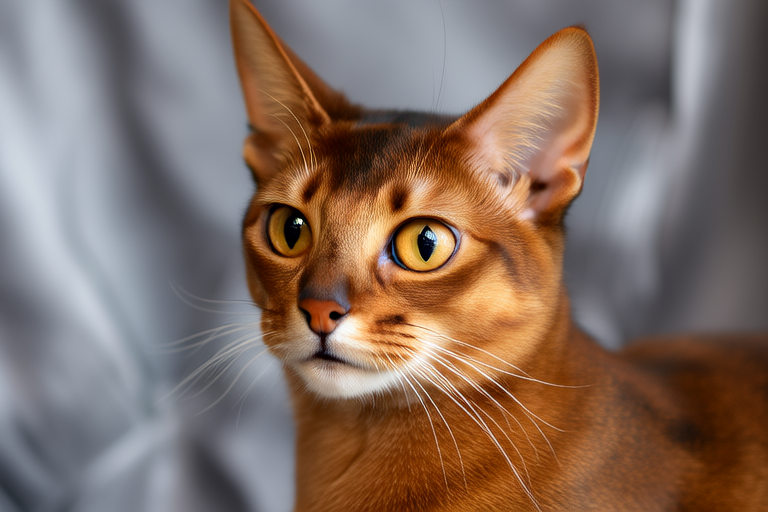Abyssinian Cats and Their Unique Genetic Trait You Need to Know About
Welcome to the fascinating world of Abyssinian cats, one of the most elegant and captivating feline breeds. Known for their striking appearance and lively personalities, these cats have captured the hearts of many cat enthusiasts. In this article, we will explore the origins and characteristics of Abyssinian cats, delve into their unique genetic trait that gives them their distinctive coat patterns and colors, and provide insights into their temperament, care requirements, and common health issues.
Origins and Characteristics
The origins of the Abyssinian cat are somewhat shrouded in mystery, but it is believed that they originated in ancient Egypt. The breed’s name suggests a connection to Ethiopia, formerly known as Abyssinia, which adds to its allure. However, modern research indicates that the Abyssinian cat may have been developed in England during the mid-19th century. Despite the uncertainty surrounding their exact origins, there is no doubt about their distinctive appearance.
Abyssinians are medium-sized cats with slender, muscular bodies. They possess long legs, large ears, and almond-shaped eyes that can be green, gold, or hazel. Their most striking feature, however, is their coat. The fur is short, fine, and lies close to the body, giving them a sleek and graceful appearance. The coat is also characterized by its ticked or agouti pattern, where each hair has bands of color along its length, creating a mottled effect. This unique coat pattern contributes significantly to their distinctiveness among other cat breeds.
The Unique Genetic Trait: The Ticked Coat Pattern
The Abyssinian cat’s ticked coat pattern is the result of a specific genetic mutation that affects the way melanin, the pigment responsible for hair color, is distributed in the coat. This mutation, known as the ta allele, causes each individual hair to have alternating light and dark bands. The presence of this gene results in a coat that appears to shimmer in different lights, adding to the breed’s allure.
This genetic trait sets the Abyssinian cat apart from other breeds, as it is relatively rare. Most other cat breeds have solid or tabby patterns, where the color is more evenly distributed throughout the coat. The ticked pattern of the Abyssinian gives them a wild and exotic look, reminiscent of their supposed ancestors from ancient times. This unique coat pattern also makes them highly sought after by cat lovers who appreciate their distinct appearance.
Temperament and Personality
Abyssinian cats are known for their lively and playful personalities. They are curious, intelligent, and often engage in interactive play. These cats enjoy exploring their surroundings and may even follow their owners around the house, seeking attention and companionship. Due to their active nature, Abyssinians thrive in households where they can engage in regular play and mental stimulation.
In addition to being playful, Abyssinians are also affectionate and loyal. They tend to bond closely with their human companions and may even develop strong attachments. However, they can be somewhat independent and may not always seek constant attention. While they enjoy company, they also value their space and may prefer to retreat to a quiet spot when they need some solitude.
Care Requirements
Despite their sleek appearance, Abyssinian cats require regular grooming to maintain their coat’s health and shine. Their short fur sheds less than longer-haired breeds, but it still requires brushing once or twice a week to remove loose hairs and prevent matting. Bathing is generally unnecessary unless the cat gets particularly dirty, but regular brushing helps keep their coat in top condition.
Abyssinians are also quite active and require ample opportunities for exercise and play. Providing them with toys, climbing structures, and scratching posts can help keep them physically and mentally stimulated. Interactive play sessions with their owners are also beneficial, fostering a stronger bond between cat and human. Additionally, ensuring that they have access to safe outdoor spaces or providing indoor enrichment can help satisfy their natural instincts.
Common Health Issues
Like all breeds, Abyssinian cats are prone to certain health conditions. One of the most significant concerns for Abyssinians is Periodontal Disease, which can lead to tooth loss and other serious health issues if left untreated. Regular dental check-ups and maintaining good oral hygiene are essential to prevent this condition. Brushing your cat’s teeth with a pet-safe toothpaste or providing dental treats can help reduce the risk of Periodontal Disease.
Another health issue to be aware of is Renal Amyloidosis, a condition where abnormal proteins accumulate in the kidneys, leading to kidney failure. While this condition is relatively rare, it is more commonly seen in Abyssinians than in other breeds. Early detection and management through diet and medication can help prolong the life of affected cats. Regular veterinary check-ups and monitoring of kidney function are crucial for identifying and managing this condition.
Abyssinians are also susceptible to Patellar Luxation, a condition where the kneecap dislocates from its normal position. This can cause discomfort and mobility issues for affected cats. While mild cases may not require treatment, more severe cases may necessitate surgical intervention. Ensuring that your Abyssinian maintains a healthy weight and avoiding excessive jumping can help reduce the risk of Patellar Luxation.
Conclusion
The Abyssinian cat is a truly remarkable breed, distinguished by its unique genetic trait responsible for its distinctive ticked coat pattern. Their origins, though somewhat mysterious, contribute to their exotic and captivating appearance. With their lively and affectionate personalities, these cats make wonderful companions for those who appreciate their intelligence and playfulness. However, potential owners should be aware of the breed’s specific care requirements and health concerns to ensure the well-being of their beloved pets.
If you’re considering bringing an Abyssinian cat into your home, take the time to learn about their needs and ensure that you can provide a loving and stimulating environment. With proper care and attention, these beautiful cats can bring years of joy and companionship to their owners.
